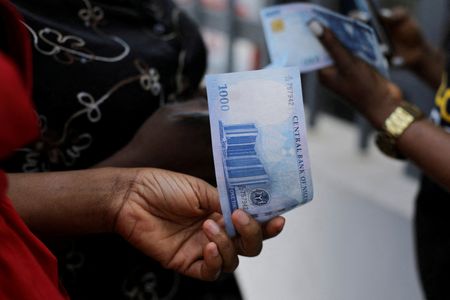By MacDonald Dzirutwe
LAGOS (Reuters) – Nigeria’s Supreme Court on Wednesday restrained the government, through the central bank, from ending the legal tender status of old banknotes on Friday following moves to replace them with newly designed notes.
The ruling came shortly after the International Monetary Fund said Nigeria should consider extending its deadline to swap old banknotes because of the disruption to trade and payments caused by a shortage of new notes.
THE PLAN
Nigeria’s central bank decided last year to start circulating newly designed 200, 500 and 1,000 naira notes, originally giving people until Jan. 31 to get rid of their old notes, which would no longer be legal tender after that date.
The bank said it wanted to reduce the amount of cash in circulation in order to better control liquidity, curb inflation and move towards a cashless economy.
Those with bank accounts were required to bring their old banknotes to a bank branch and have the corresponding amount credited to their accounts.
Millions of Nigerians who do not have bank accounts, especially in rural areas, were expected to exchange their old notes for new ones at banking agents.
In late January, the central bank extended the deadline until Feb. 10 to allow more people in rural communities to exchange their old notes.
GOALS
Almost 85% of the 3.23 trillion naira ($7.18 billion) in cash in circulation had been held outside of banks. In January, the central bank said around 1.3 trillion naira had been deposited into banks since October
To achieve its aim of reducing liquidity, the central bank said it would limit weekly cash withdrawals for bank account holders at 100,000 naira from January onwards.
Another stated goal of the changeover was to reduce fraud as the central bank says the new notes’ security features will make them harder to counterfeit.
COMPLAINTS
Many Nigerians complained the deadline was too tight for those living in rural areas or working in informal markets.
Politically, the plan came at a sensitive time, with elections for president, National Assembly seats, state governors and local authorities due in late February and March.
Politicians, who typically use hard to trace cash for campaign handouts, denounced the plan as too draconian.
With cash accounting for only 6% of Nigeria’s total money supply of 50 trillion naira, analysts doubted the operation would help the central bank’s stated goal of getting a grip on money supply and inflation.
(Additional reporting by Chijioke Ohuocha; Editing by James Macharia Chege and Chizu Nomiyama)

